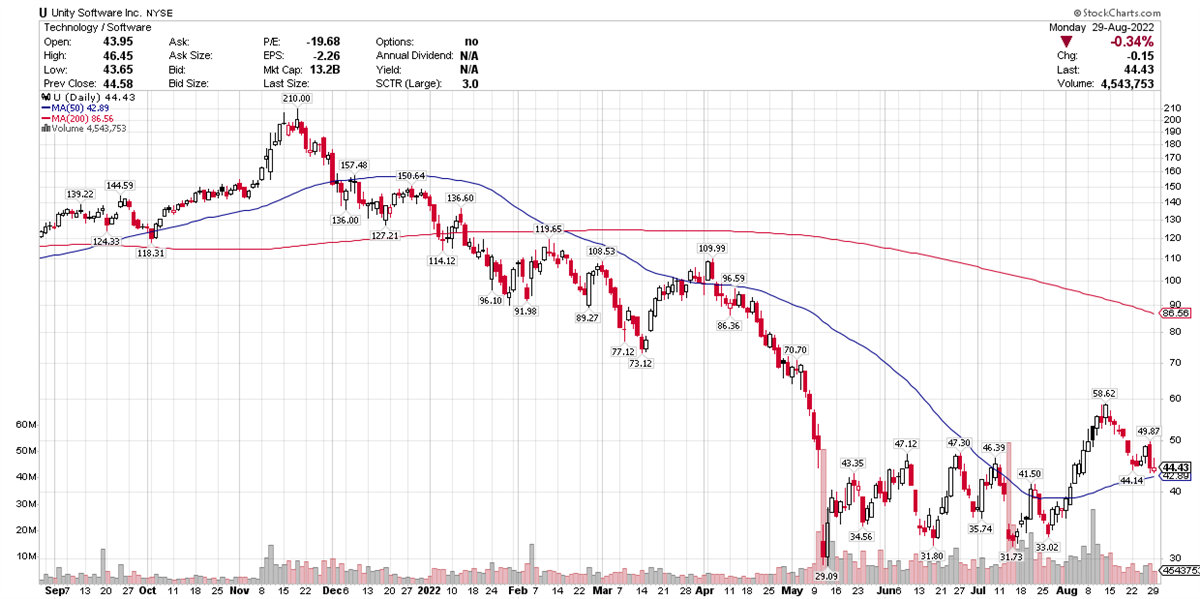 Unity Software (NYSE: U) has been on a wild ride in the past few weeks following an earnings report and some corporate drama surrounding acquisitions.
Unity Software (NYSE: U) has been on a wild ride in the past few weeks following an earnings report and some corporate drama surrounding acquisitions. Unity runs a software platform for creators and sponsors of real-time three-dimensional content. Customers use Unity’s platform to develop, run and monetize content for virtual-reality gear, smartphones, tablets, consoles, personal computers and other devices. The San Francisco-based company does business globally, with customers hailing from the animation, gaming, design and architecture industries.
The company reported its second quarter on August 9. It lost $0.18 per share on revenue of $297 million. According to MarketBeat data, that came in ahead of bottom-line views, but missed on the top line.
One highlight from the earnings report: The success of Unity's Create Solutions unit, which helps customers develop 3D content.
“The second quarter of 2022 was consistent with our guidance with strong performance in Create Solutions,” said Unity CEO John Riccitiello in a statement.
“In Create we have momentum with customers in and outside of Games,” added Unity CFO Luis Visoso. “Our Business outside of Games is growing even faster and now represents 40% of our total Create Solutions revenue, up from 25% in 2021.”
Create Solutions’ revenue was $120.9 million, an increase of 66%.
Boosted Price Targets
Analysts have a “moderate buy” rating on the stock, with a price target of $76, an upside of 71.06%. Since the earnings report, six analysts either boosted their price targets or initiated coverage with an “outperform” rating. Citigroup lowered its target from $68 to $61, but that still represents a 17% upside.
The stock has larger-than-average trading volume as it notched gains in the past two months. It posted an increase of 1.55% in July and then a gain of 18.83% so far this month.
Upside volume was 46% heavier than normal the week ended August 12, as investors piled in after the report. However, it pulled back in the subsequent weeks, albeit in below-average turnover.
Unity is underperforming the broader markets by a wide degree. Below are the recent returns:
- One week: -6.48%
- One month: +33%
- Three months: +16.34
- Year-to-date: -68.82%
But there’s more going on behind the scenes at Unity that could affect investor sentiment.
In July, Unity announced a merger agreement with Israel-based ironSource (NYSE: IS). According to the companies, IronSource helps “mobile content creators turn their apps into scalable, successful businesses.” The transaction was valued at approximately $4.4 billion.
Unity’s board authorized a share buyback program of up to $2.5 billion effective upon closing of the transaction. In addition, investment firms Silver Lake and Sequoia, the two largest Unity shareholders, committed to investing an aggregate $1 billion in Unity in the form of convertible notes to be issued at closing of the transaction.
The deal is expected to close in the fourth quarter.
But wait, there’s more. While the merger with ironSource seemed to make investors happy, there was a different piece of merger news on August 9.
Not Lovin’ The AppLovin Offer
AppLovin (NASDAQ: APP) made an offer to buy Unity for $20 billion in an all-stock deal. This deal, however, is contingent upon Unity canceling its merger with ironSource, which is a more direct competitor with AppLovin.
Unity’s board rejected AppLovin’s offer. On August 15, it issued a statement saying it “unanimously determined that it is not in the best interests of Unity shareholders and would not reasonably be expected to result in a ‘Superior Proposal’ as defined in Unity’s merger agreement with ironSource.”
Unity shares fell 7% on August 15, following news of the rejected offer.
Even without being acquired by AppLovin, there appears to be strong investor sentiment surrounding Unity.
For example, Cathie Woods’ ARK Investment Management is a major shareholder, owning more than 9 million shares. As recently as July 13, it added 884,587 shares to the ARK Innovation ETF (NYSEARCA: ARKK); 62,320 shares to the ARK Autonomous Technology & Robotics ETF (NYSEARCA: ARKQ) and16,724 shares to the ARK Space Exploration & Innovation ETF (NYSEARCA: ARKX).
Institutional buying is what ultimately sends a stock higher. If the mutual funds, ETFs, hedge funds, pension funds and other big investors continue to have confidence in Unity, that will send the price higher, regardless of the rejected AppLovin offer. 





